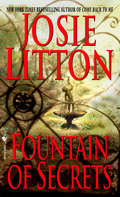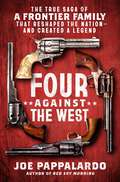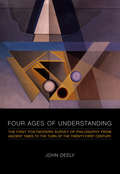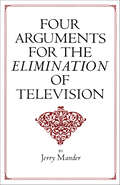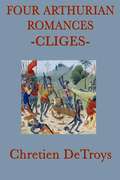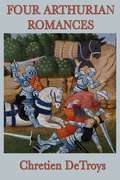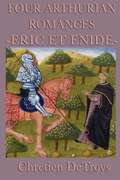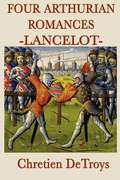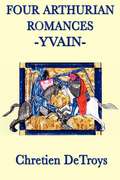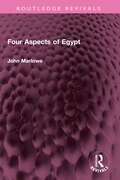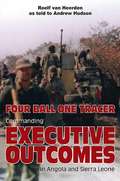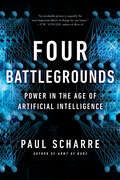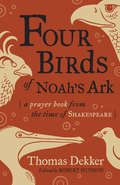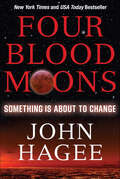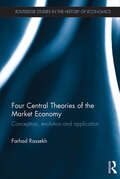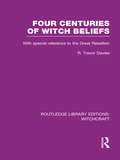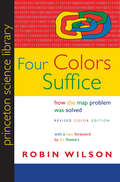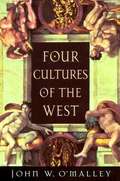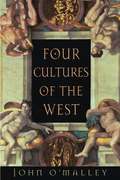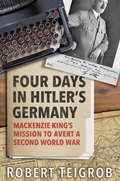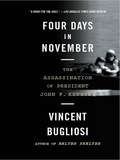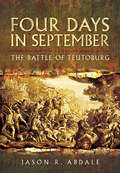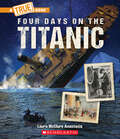- Table View
- List View
Fountain of Secrets (Akora)
by Josie LittonIn a captivating tale that returns readers to the enchanting island nation of Akora, a remarkable young man and woman, torn between love for each other and duty to their homelands, discover that fate has not forgotten them.Fountain of SecretsHonorable, loyal, and deeply devoted to his family, Gavin, the eldest son of the earl of Hawkforte, is also a young man with a troubling secret. Disillusioned by the colonialist course his country is pursuing, Gavin has no wish to succeed his father. Rather, his heart is drawn toward the other half of his heritage--the wondrous kingdom of Akora and the life he senses awaits him there. His future will in fact be more astonishing than even he can imagine, but before it can begin, he must resolve his conflict--and his feelings for the woman he loves.Strikingly beautiful, intelligent, and dedicated to her homeland, Elena knows her fate is to be the wife and helpmate of the next ruler of Akora. Tragically, it is a destiny she believes must keep her apart from Gavin, the English nobleman who commands her heart. But together the couple will soon discover that the future cannot always be predicted--especially one that holds more hidden surprises, dangers, and rich rewards than either of them could have dreamed.
Four Against the West: The True Saga of a Frontier Family That Reshaped the Nation—and Created a Legend
by Joe PappalardoA thrilling true saga of legendary Texas figure Judge Roy Bean and his brothers―and their violent adventures in Wild West America.Roy Bean was an American saloon-keeper and Justice of the Peace in Texas, who called himself "The Only Law West of the Pecos". He and his three brothers set out from Kentucky in the mid 1840s, heading into the American frontier to find their fortunes. Their lifetimes of triumphs, tragedies, laurels and scandals will play out on the battlefields of Mexico, in shady dealings in California city halls, inside eccentric saloon courtrooms of Texas, and along the blood-soaked Santa Fe Trail from Missouri to New Mexico. They will kill men, and murder will likewise stalk them.The Beans chase their American dreams as the nation reinvents itself as a coast-to-coast powerhouse, only to be tested by the Civil War. During their saga, the brothers become soldiers, judges, husbands, guerillas, lawmen, entrepreneurs, refugees, fathers, politicians, pioneers and – in Judge Roy Bean’s case – one of the Old West’s best known but least understood scoundrels.Using new information gleaned from exhaustive research, Joe Pappalardo's Four Against the West is an unprecedented and vivid telling of the intertwined stories of all four Bean brothers, exploring for the first time how their relentless ambitions helped create a new America.
Four Ages of Understanding: The First Postmodern Survey of Philosophy from Ancient Times to the Turn of the Twenty-First Century (Toronto Studies in Semiotics and Communication)
by John DeelyThis book redraws the intellectual map and sets the agenda in philosophy for the next fifty or so years. By making the theory of signs the dominant theme in Four Ages of Understanding, John Deely has produced a history of philosophy that is innovative, original, and complete. The first full-scale demonstration of the centrality of the theory of signs to the history of philosophy, Four Ages of Understanding provides a new vantage point from which to review and reinterpret the development of intellectual culture at the threshold of "globalization". Deely examines the whole movement of past developments in the history of philosophy in relation to the emergence of contemporary semiotics as the defining moment of Postmodernism. Beginning traditionally with the Pre-Socratic thinkers of early Greece, Deely gives an account of the development of the notion of signs and of the general philosophical problems and themes which give that notion a context through four ages: Ancient philosophy, covering initial Greek thought; the Latin age, philosophy in European civilization from Augustine in the 4th century to Poinsot in the 17th; the Modern period, beginning with Descartes and Locke; and the Postmodern period, beginning with Charles Sanders Peirce and continuing to the present. Reading the complete history of philosophy in light of the theory of the sign allows Deely to address the work of thinkers never before included in a general history, and in particular to overcome the gap between Ockham and Descartes which has characterized the standard treatments heretofore. One of the essential features of the book is the way in which it shows how the theme of signs opens a perspective for seeing the Latin Age from its beginning with Augustine to the work of Poinsot as an indigenous development and organic unity under which all the standard themes of ontology and epistemology find a new resolution and place. A magisterial general history of philosophy, Deely's book provides both a strong background to semiotics and a theoretical unity between philosophy's history and its immediate future. With Four Ages of Understanding Deely sets a new agenda for philosophy as a discipline entering the 21st century.
Four Arguments for the Elimination of Television
by Jerry Mander“Persuasive . . . interesting and unusual.” —Kirkus ReviewsA total departure from previous writing about television, this book is the first ever to advocate that the medium is not reformable. Its problems are inherent in the technology itself and are so dangerous—to personal health and sanity, to the environment, and to democratic processes—that TV ought to be eliminated forever.Weaving personal experiences with meticulous research, the author ranges widely over aspects of television that have rarely been examined and never before joined together, allowing an entirely new, frightening image to emerge. The idea that all technologies are neutral, benign instruments that can be used well or badly is thrown open to profound doubt. Speaking of TV reform is, in the words of the author, “as absurd as speaking of the reform of a technology such as guns.”Praise for the work of Jerry Mander“Lively, provocative.” —Publishers Weekly“A skilled writer.” —Kirkus Reviews (starred review)
Four Arthurian Romances: Cliges
by Chretien DetroysIt tells the story of the knight Cligès and his love for his uncle's wife, Fenice. Because of the story's de-romanticized depiction of adultery, it has been called a criticism or parody of the Tristan and Isolde romances. Cligès scholar Lucie Polak not only verifies the Tristan and Isolde reworking found in the text, but also suggests that Cligès may be modeled after Ovid's character Narcissus.
Four Arthurian Romances: Complete
by Chretien DetroysChrétien's works include five major poems in rhyming eight-syllable couplets. Four of these are complete; Erec and Enide (c. 1170); Cligès (c. 1176), and Yvain, the Knight of the Lion and Lancelot, the Knight of the Cart, both written simultaneously between 1177 and 1181. Chrétien's final romance was Perceval, the Story of the Grail, written between 1181 and 1190, but left unfinished, though some scholars have disputed this.
Four Arthurian Romances: Eric Et Enide
by Chretien DetroysErec et Enide features many of the common elements of Arthurian romance, such as Arthurian characters, the knightly quest, and women or love as a catalyst to action. While it is not the first story to use conventions of the Arthurian characters and setting, Chrétien de Troyes is credited with the invention of the Arthurian romance genre by establishing expectation with his contemporary audience based on its prior knowledge of the subjects.
Four Arthurian Romances: Lancelot
by Chretien DetroysThe action centers on Lancelot's rescue of the queen after she has been abducted by Meleagant, the son of Bademagu. The Abduction of Guinevere is one of the oldest motifs in Arthurian legend, appearing also in Caradoc of Llancarfan's Life of Gildas and carved on the archivolt in Modena Cathedral.
Four Arthurian Romances: Yvain
by Chretien DetroysIn the poem, Yvain seeks to avenge his cousin Calogrenant who had been defeated by an otherworldly knight Esclados beside a magical storm-making stone in the forest of Brocéliande. Yvain defeats Esclados and falls in love with his widow Laudine.
Four Aspects of Egypt (Routledge Revivals)
by John MarloweFirst Published in 1966 Four Aspects of Egypt provides a picturesque tour of Egypt for visitors and new arrivals in the country. John Marlowe takes us on a journey by discussing the splendour and durability of the remains of Egypt’s ancient civilization; the mosques, tombs, khans (inns) and sibilas (fountains) of mediaeval Cairo; the total dependence of Egypt upon the Nile and its life-giving waters; and with efforts of modernization in the country, to capture its enchantment through descriptions of the land and its history. This book will be an interesting read for general readers interested in history of Egypt and travelogues.
Four Ball One Tracer: Commanding Executive Outcomes In Angola And Sierra Leone
by Roelf Van Heerden Andrew HudsonBrutally honest and devoid of hyperbole, this is Roelf van Heerden's Executive Outcomes. Unapologetic, unassuming and forthright, the combat exploits of Executive Outcomes (EO) in Angola and Sierra Leone are recounted for the first time by a battlefield commander who was physically on the ground during all their major combat operations. From fighting UNITA for the critical oil installations and diamond fields of Angola to the offensive against the RUF in Sierra Leone to capture the Kono diamond fields and the palace coup which ousted Captain Valentine Strasser, van Heerden was at the forefront. He tells of the tragedy of child soldiers, illegal diamond mining and the curse of government soldiers who turn on their own people; he tells of RUF atrocities, the harrowing attempt to rescue a downed EO pilot and the poignant efforts to recover the remains of EO soldiers killed in action. Coupled with van Heerden's gripping exposé, hitherto unpublished photographs, order of battle charts and battle maps offer unprecedented access to the major actions as they took place on the ground during the heydays of EO.
Four Battlegrounds: Power In The Age Of Artificial Intelligence
by Paul ScharreAn NPR 2023 "Books We Love" Pick One of the Next Big Idea Club's Must-Read Books "An invaluable primer to arguably the most important driver of change for our future." —P. W. Singer, author of Burn-In An award-winning defense expert tells the story of today’s great power rivalry—the struggle to control artificial intelligence. A new industrial revolution has begun. Like mechanization or electricity before it, artificial intelligence will touch every aspect of our lives—and cause profound disruptions in the balance of global power, especially among the AI superpowers: China, the United States, and Europe. Autonomous weapons expert Paul Scharre takes readers inside the fierce competition to develop and implement this game-changing technology and dominate the future. Four Battlegrounds argues that four key elements define this struggle: data, computing power, talent, and institutions. Data is a vital resource like coal or oil, but it must be collected and refined. Advanced computer chips are the essence of computing power—control over chip supply chains grants leverage over rivals. Talent is about people: which country attracts the best researchers and most advanced technology companies? The fourth “battlefield” is maybe the most critical: the ultimate global leader in AI will have institutions that effectively incorporate AI into their economy, society, and especially their military. Scharre’s account surges with futuristic technology. He explores the ways AI systems are already discovering new strategies via millions of war-game simulations, developing combat tactics better than any human, tracking billions of people using biometrics, and subtly controlling information with secret algorithms. He visits China’s “National Team” of leading AI companies to show the chilling synergy between China’s government, private sector, and surveillance state. He interviews Pentagon leadership and tours U.S. Defense Department offices in Silicon Valley, revealing deep tensions between the military and tech giants who control data, chips, and talent. Yet he concludes that those tensions, inherent to our democratic system, create resilience and resistance to autocracy in the face of overwhelmingly powerful technology. Engaging and direct, Four Battlegrounds offers a vivid picture of how AI is transforming warfare, global security, and the future of human freedom—and what it will take for democracies to remain at the forefront of the world order.
Four Birds of Noah's Ark: A Prayer Book from the Time of Shakespeare
by Thomas DekkerA timeless, little-known literary classic to engage a new generation of readers As the Black Death ravaged London in 1608, in the midst of societal chaos and tragedy, playwright Thomas Dekker wrote Four Birds of Noah&’s Ark, a book containing fifty-six prayers for the people of London and all of England. The prayers in this book bear witness to Dekker&’s deep faith with a power and poignancy that few written prayers in English literature achieve. Bringing Dekker&’s devotional classic back into print for the first time since 1924, editor Robert Hudson has annotated the prayers and modernized their language without sacrificing their enchanting beauty and simplicity. Hudson&’s substantive and illuminating introduction is a gem in itself.
Four Birds of Noah's Ark: A Prayer Book from the Time of Shakespeare
by Thomas DekkerA timeless, little-known literary classic to engage a new generation of readers As the Black Death ravaged London in 1608, in the midst of societal chaos and tragedy, playwright Thomas Dekker wrote Four Birds of Noah&’s Ark, a book containing fifty-six prayers for the people of London and all of England. The prayers in this book bear witness to Dekker&’s deep faith with a power and poignancy that few written prayers in English literature achieve. Bringing Dekker&’s devotional classic back into print for the first time since 1924, editor Robert Hudson has annotated the prayers and modernized their language without sacrificing their enchanting beauty and simplicity. Hudson&’s substantive and illuminating introduction is a gem in itself.
Four Blood Moons: Something is About to Change
by John Hagee". . .There will be signs in the sun, in the moon, and in the stars. . .Now when these things begin to happen, look up and lift up your heads, because your redemption draws near." Luke 21:25a, 28It is rare that Scripture, science, and history align with each other, yet the last three series of Four Blood Moons have done exactly that. Are these the "signs" that God refers to in His Word? If they are, what do they mean?What is their prophetic significance?
Four Central Theories of the Market Economy: Conception, evolution and application (Routledge Studies in the History of Economics)
by Farhad RassekhThis highly original work offers an intellectual history of four central theories underlying the market economic system, focusing on their conception, evolution, and applications. Four Central Theories of the Market Economy traces the root of the theories, their conception and articulation, as well as their evolutions to the present time. It focuses on the four theories that are generally recognized as fundamental to the discipline of economics: the invisible hand, comparative advantage, the law of markets, and the quantity theory of money. These theories have profoundly influenced the world. Chapters explore their rich intellectual history from classical Greece to today, drawing on the original works of the great economic minds of the classical era and other thinkers who prepared the path for them, as well as those who refined their works or challenged them. This volume will leave the reader with a deep understanding of these pillars of the market economic system in the context of their historical development. This book will be of great interest to all scholars and students of economics who are interested in the intellectual history of their discipline as well as scholars and students of intellectual history who are interested in economics.
Four Centuries of Witch Beliefs: With Special Reference To The Great Rebellion (Routledge Library Editions: Witchcraft)
by R. T. DaviesOriginally published in 1947, it is the essential purpose of this book to investigate attitudes of leading Elizabethan and Stuart statesmen, ask whether witchcraft was of any importance in seventeenth-century English history, or even influenced the Great Rebellion. The reader is placed in possession of the more pertinent passages from the arguments used to support or discredit belief in witchcraft.
Four Colors Suffice: How the Map Problem Was Solved - Revised Color Edition (Princeton Science Library #128)
by Robin WilsonOn October 23, 1852, Professor Augustus De Morgan wrote a letter to a colleague, unaware that he was launching one of the most famous mathematical conundrums in history--one that would confound thousands of puzzlers for more than a century. This is the amazing story of how the "map problem" was solved. The problem posed in the letter came from a former student: What is the least possible number of colors needed to fill in any map (real or invented) so that neighboring counties are always colored differently? This deceptively simple question was of minimal interest to cartographers, who saw little need to limit how many colors they used. But the problem set off a frenzy among professional mathematicians and amateur problem solvers, among them Lewis Carroll, an astronomer, a botanist, an obsessive golfer, the Bishop of London, a man who set his watch only once a year, a California traffic cop, and a bridegroom who spent his honeymoon coloring maps. In their pursuit of the solution, mathematicians painted maps on doughnuts and horseshoes and played with patterned soccer balls and the great rhombicuboctahedron. It would be more than one hundred years (and countless colored maps) later before the result was finally established. Even then, difficult questions remained, and the intricate solution--which involved no fewer than 1,200 hours of computer time--was greeted with as much dismay as enthusiasm. Providing a clear and elegant explanation of the problem and the proof, Robin Wilson tells how a seemingly innocuous question baffled great minds and stimulated exciting mathematics with far-flung applications. This is the entertaining story of those who failed to prove, and those who ultimately did prove, that four colors do indeed suffice to color any map. This new edition features many color illustrations. It also includes a new foreword by Ian Stewart on the importance of the map problem and how it was solved.
Four Comedies: The Braggart Soldier; The Brothers Menaechmus; The Haunted House; The Pot of Gold (Oxford World's Classics)
by Erich Segal PlautusPlautus was the single greatest influence on Western comedy. In fact, Shakespeare's Comedy of Errors and Moliere's the Miser are two subsequent classics directly based on Plautine originals. Plautus himself borrowed from the Greeks, but his jokes, rapid dialogue, bawdy humor, and irreverent characterizations are the original work of an undisputed genius. The comedies printed here show him at his best, and Professor Segal's translations keep their fast, rollicking pace intact, making these the most readable and actable versions available. This volume includes, The Braggart Soldier, e Brothers Menaechmus, The Haunted House, and The Pot of Gold.
Four Cultures Of The West
by John W. O'MalleyTHIS BOOK IS about four phenomena in the history of the West. I call them cultures. In illustrating their characteristics I make large use of my specialty, the history of Christianity. I have written the book for anyone interested in either of those two histories, which for long periods were in fact almost indistinguishable from each other. I have written it, therefore, for specialists, for students, and for the general reader. Specialists will be familiar with the persons, issues, and movements I discuss, but I hope that my approach will stimulate them to think about these subjects in a new way.
Four Cultures of the West
by John W. O'MalleyThe workings of Western intelligence in our day--whether in politics or the arts, in the humanities or the church--are as troubling as they are mysterious, leading to the questions: Where are we going? What in the world were we thinking? By exploring the history of four "cultures" so deeply embedded in Western history that we rarely see their instrumental role in politics, religion, education, and the arts, this timely book provides a broad framework for addressing these questions in a fresh way. The cultures considered here originated in the ancient world, took on Christian forms, and manifest themselves today in more secular ways. These are, as John W. O'Malley identifies them: the prophetic culture that proclaims the need for radical change in the structures of society (represented by, for example, Jeremiah, Martin Luther, and Martin Luther King, Jr.); the academic culture that seeks instead to understand those structures (Aristotle, Aquinas, the modern university); the humanistic culture that addresses fundamental human issues and works for the common good of society (Cicero, Erasmus, and Eleanor Roosevelt); and the culture of art and performance that celebrates the mystery of the human condition (Phidias, Michelangelo, Balanchine). By showing how these cultures, as modes of activity and discourse in which Western intelligence has manifested itself through the centuries and continues to do so, O'Malley produces an essay that especially through the history of Christianity brilliantly illuminates the larger history of the West.
Four Days in Hitler’s Germany: Mackenzie King’s Mission to Avert a Second World War
by Robert TeigrobIn 1937, Canadian Prime Minister Mackenzie King travelled to Nazi Germany in an attempt to prevent a war that, to many observers, seemed inevitable. The men King communed with, including Adolf Hitler, had assured him of the Nazi regime’s peaceful intentions, and King not only found their pledges sincere, but even hoped for personal friendships with many of the regime officials. Four Days in Hitler’s Germany is a clearly written and engaging story that addresses how King truly believed that any threat to peace would come only from those individuals who intended to thwart the Nazi agenda, which as King saw it, was concerned primarily with justifiable German territorial and diplomatic readjustments. Mackenzie King was certainly not alone in misreading the omens in the 1930s, but it would be difficult to find a democratic leader who missed the mark by a wider margin. This book seeks to explain the sources and outcomes of King’s misperceptions and diplomatic failures, and follows him as he returns to Germany to tour the appalling aftermath of the very war he had tried to prevent.
Four Days in November: The Assassination Of President John F. Kennedy
by Vincent Bugliosi"A book for the ages."--?Los Angeles Times Book Review Four Days in November is an extraordinarily exciting, precise, and definitive narrative of the assassination of President John F. Kennedy on November 22, 1963, by Lee Harvey Oswald. It is drawn from Reclaiming History: The Assassination of President John F. Kennedy, a huge and historic account of the event and all the conspiracy theories it spawned, by Vincent Bugliosi, famed prosecutor of Charles Manson and author of Helter Skelter. For general readers, the carefully documented account presented in Four Days is utterly persuasive: Oswald did it and he acted alone.
Four Days in September: The Battle of Teutoburg
by Jason R. AbdaleThe author of The Great Illyrian Revolt examines one of the Roman Empire's most pivotal defeats—a surprise attack by Germanic barbarians in 9 AD. For twenty years, the Roman Empire conquered its way through modern-day Germany, claiming all lands from the Rhine to the Elbe. However, when at last all appeared to be under control, a catastrophe erupted that claimed the lives of 10,000 legionnaires and laid Rome's imperial ambitions for Germania into the dust. In late September of 9 AD, three Roman legions, while marching to suppress a distant tribal rebellion, were attacked in a four-day battle with the Germanic barbarians. The Romans under the leadership of the province's governor, Publius Quinctilius Varus, were taken completely by surprise, betrayed by a member of their own ranks: the German officer and secret rebel leader, Arminius. The defeat was a heavy blow to both Rome's military and its pride. Though the disaster was ruthlessly avenged soon afterwards, later attempts at conquering the Germans were half-hearted at best.Four Days in September thoroughly examines the ancient sources and challenges the hypotheses of modern scholars to present a clear picture of the prelude to the battle, the fighting itself and its aftermath.
Four Days on The Titanic (A True Book (Relaunch))
by Laura McClure AnastasiaRediscover the story of the largest and most luxurious ship ever built!For the first four days, everything went as planned on the Titanic. First-class passengers enjoyed their large, beautifully furnished rooms and 10-course meals in the ship's fanciest dining room. They also enjoyed using the reading rooms, the huge swimming pool, and the gymnasium. Second- and third-class passengers sailed in their not quite so fancy facilities. Then, on the evening of April 14, just one day short of arriving in New York, the Titanic struck an iceberg. 2 hours and 40 minutes later, the "unsinkable" ship disappeared beneath the waves. More than 1,500 of the 2,200 people on board perished. It was the biggest maritime tragedy to date. Four Days on the Titanic offers a firsthand look at life, and tragedy, on this mighty vessel.ABOUT THIS SERIES: On the night of April 14-15, 1912, the largest and most luxurious ship ever built hit an iceberg and sunk on her maiden voyage. More than 100 years later, the Titanic continues to fascinate. How did this supposedly "unsinkable" ship meet its icy fate? Who were the people who sailed on the ship, and what was that experience like before, during, and after the disaster? What did explorers discover in 1985 when they found the sunken ship at the bottom of the Atlantic Ocean? Featuring historical imagery, first-hand accounts, and lively text, the four titles in this series will answer all these questions… and more.
